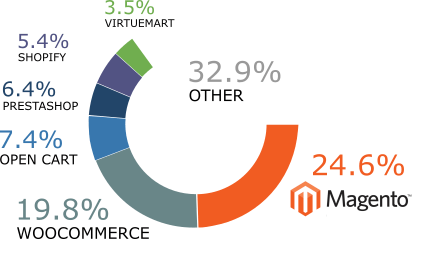
6 tips to test magento e-commerce applications
Electronic commerce is the trading in goods or services via the Internet. Nowadays, e-commerce is developing by leaps and bounds. According to statista.com, in 2013 41.3% of global internet users purchased products online. In 2017 this figure is expected to reach 46.4%. This fact drives the business to enter the online trading market.
To build online stores, most organizations are using Magento, a powerful and multifunctional e-commerce platform. It offers great flexibility due to its modular architecture. This platform covers 24.6% of e-commerce today (Hivemind Research).

A wide range of functions helps Magento win customers worldwide. According to cometrics.co, Magento is used in all parts of the world. The largest number of users is allocated in North America and Australia.

Advantages of the Magento platform
Magento has gained its popularity for a number of reasons:
- Stable system with regular updates that cover issues appearing in the system
- Possibility to create multiple stores in one control system
- Multilingual system
- Free Community Edition that gives user an opportunity to try Magento before purchasing it
- SEO friendly system
- User friendly and intuitive administration interface
- A huge number of extensions
Disadvantages of the Magento platform
As any other system, Magento is not perfect and has some drawbacks:
- Performance (good hosting is required)
- Magento customizing is rather complicated
- Enterprise Edition is expensive
- Many extensions lead to a great amount of bugs
Setting up the Magento platform
During the setting up process, it is advisable to pay attention to:
- Performance
- Compatibility of extensions
- Payment methods
- Responsive design
Testing Magento e-commerce applications
The more functions a platform provides, the more vulnerable it is. Therefore, thorough testing is vital for Magento e-commerce applications to prevent end users from facing defects and errors. a1qa has considerable experience in testing online stores on the Magento platform. We have the first-hand knowledge of all pitfalls and bottlenecks connected with Magento.
a1qa experts advise to use the following testing tips:
- Provide cross-browser and mobile testing (front-end testing on various browsers and mobile devices, e.g. we encountered absolutely different issues on Firefox and Google Chrome).
- Check that every installed extension is compatible with other extensions (make sure that a plugged-in extension works properly, provide regression testing for extensions with similar or connected functionality, one extension can cause a problem in another one).
- Carry out performance testing (check the application under a heavy load and large amount of data to be sure that a great number of orders won’t make your online store go down).
- Check every payment method (calculation should be correct and the payment process should be clear to the customer).
- Double-check calculation on checkout and basket pages (especially with vouchers, promotions and gift cards).
- Automate typical workflows (recommended to run after every change and helps detect problems in the early stages).
Magento offers a lot of possibilities for starting or growing great online business and satisfying end users’ needs. A sound approach to setting up and testing will make e-business work right and bring profit.








